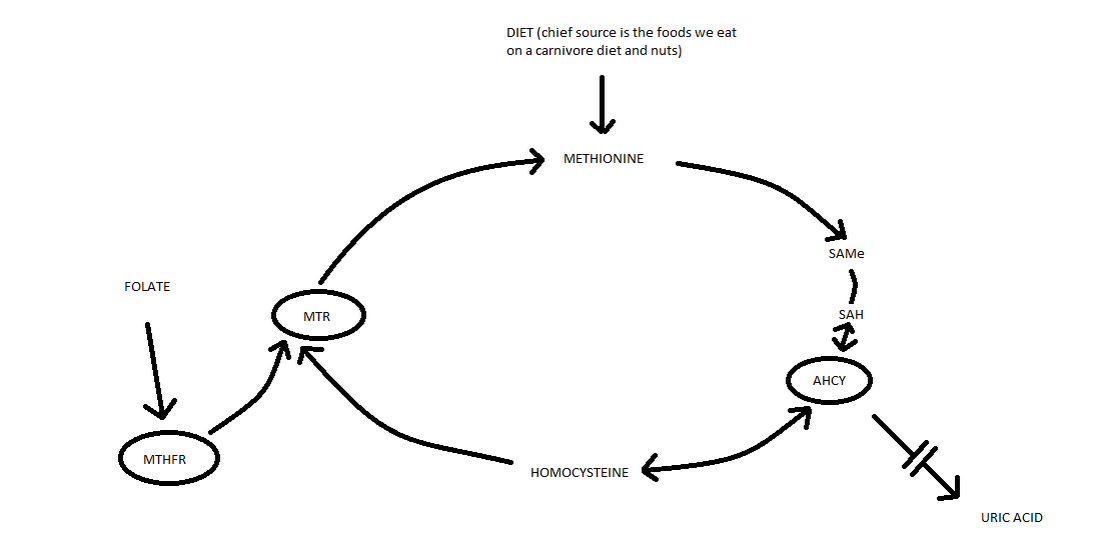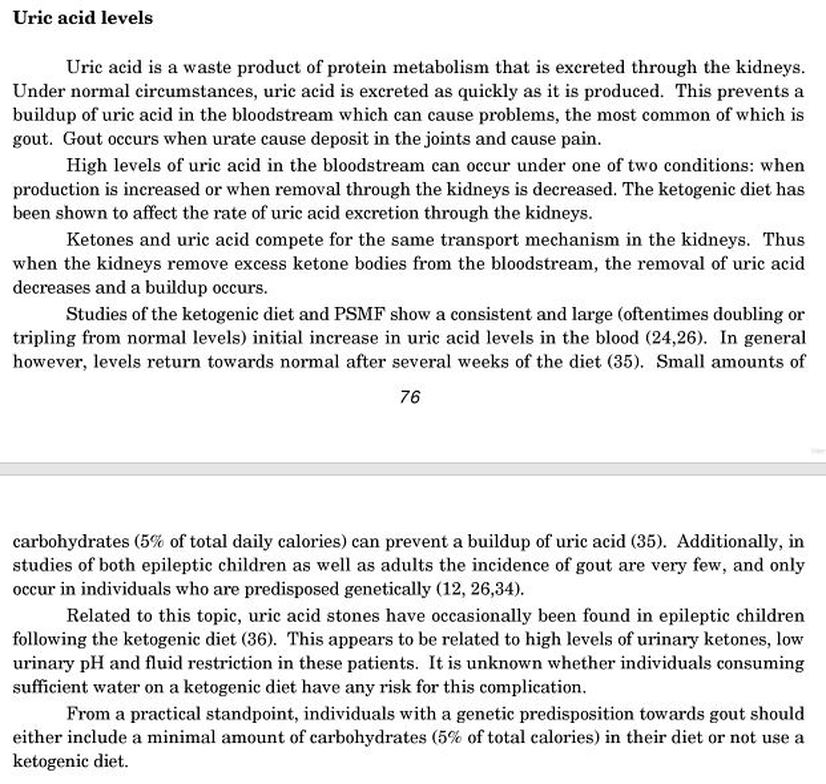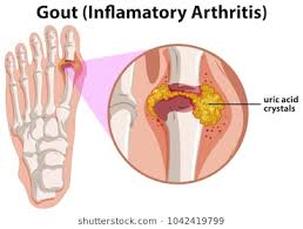Stuff I've Said on Facebook About Gout
Georgia Ede has written a good chapter on gout. I've got a link to it and other stuff I've found out about it on a page I put together for quick reference. (This page in fact.)
In my case I've found that high uric acid isn't the problem so much as changing levels of ketones. Ketones compete with uric acid for excretion and when you are changing your diet it can bring on gout attacks with both a rise OR a fall in uric acid levels.
Modern medical mythology persists with the idea that gout is linked with purines and meat eating. They have found that they can prescribe drugs (like alopurinol) and bring about some relief while dispensing advice like "lower your red meat intake" etc.
I have found that while my uric acid was on the rise during my health decline on a standard diet, it had a bit of a spike (as did my lipids) when I started LCHF and ZC, but then started to go down as I settled more into my ZC lifestyle. My gout 'attacks' seemed to come when I was losing weight (particularly when I fasted for a period like 5 days).
The last doctor I saw regarding it noted that I'd changed my level down to within 'normal' range and said that the best idea would be to take a diclofenac (slow release) whenever I felt a bit of gout pain starting up. This advice seems to have worked and has headed off the gout pain at the pass about 3 times in the last 12 months.
Another possible factor in my lowered numbers on the graph is that I've been supplementing vitamin D3 at a daily rate of 5000IU for the last year and a half. It has such a central role in 500 odd metabolic reactions in our body that I cannot discount it as a player in some of my outcomes.
In my case I've found that high uric acid isn't the problem so much as changing levels of ketones. Ketones compete with uric acid for excretion and when you are changing your diet it can bring on gout attacks with both a rise OR a fall in uric acid levels.
Modern medical mythology persists with the idea that gout is linked with purines and meat eating. They have found that they can prescribe drugs (like alopurinol) and bring about some relief while dispensing advice like "lower your red meat intake" etc.
I have found that while my uric acid was on the rise during my health decline on a standard diet, it had a bit of a spike (as did my lipids) when I started LCHF and ZC, but then started to go down as I settled more into my ZC lifestyle. My gout 'attacks' seemed to come when I was losing weight (particularly when I fasted for a period like 5 days).
The last doctor I saw regarding it noted that I'd changed my level down to within 'normal' range and said that the best idea would be to take a diclofenac (slow release) whenever I felt a bit of gout pain starting up. This advice seems to have worked and has headed off the gout pain at the pass about 3 times in the last 12 months.
Another possible factor in my lowered numbers on the graph is that I've been supplementing vitamin D3 at a daily rate of 5000IU for the last year and a half. It has such a central role in 500 odd metabolic reactions in our body that I cannot discount it as a player in some of my outcomes.
Here is a good article on the relationship between uric acid, ascorbic acid and life in the modern world - a longish read but very well referenced.
Uric Acid and Vitamin C: Devolution of Evolution in a 5G World
Uric Acid and Vitamin C: Devolution of Evolution in a 5G World
Uric acid is increasingly associated with metabolic diseases like insulin resistance, diabetes, hypertension, cardiovascular diseases, and even cancer. Humans, unlike other animals, are unable to produce ascorbic acid, vitamin C.[1] On top of that, humans have also lost the ability to degrade uric acid. [2] It is believed that during evolution, increased uric acid as a result of genetic mutations, was instrumental in the survival of hominids as it offered not only antioxidant protection, but the ability to suppress insulin signaling, modulating insulin resistance and gluconeogenesis as adaptation to extended periods of food shortages during dramatic climate shifts. In our world today, hyperuricemia, or excess serum uric acid can be the result of genetic polymorphisms, or diet modifications that rely on high levels of meat, seafood or even fat. The fact that hyperuricemia is often associated with various metabolic diseases and health disorders including gout, may be indications that it no longer serves the protective roles it once did millions of years ago. In the attempt to recreate physiological responses that mirror our hominin hunter-gatherer ancestors, the reliance on low carbohydrate/zero carbohydrate, paleo, 100% carnivorous, or even ketogenic diets may encounter unexpected challenges from evolutionary adaptations that are contradictory in nature: that of insulin resistance and insulin sensitivity. This article will attempt to explain why uric acid was indispensable in the past; the roles uric acid play in insulin signaling, and how its limitations as an antioxidant and its inverse relationship with ascorbic acid are affected by our high technology world, ultimately changing the nature of its once protective features.
Update: Someone has been looking into the association between MTHFR and gout. This may be a productive new avenue to explore and I'm going to put links and theory under this category on a separate page. Go here for the page on Methylyation - Particularly as it Applies to Gout
What about methylation and gout.

In VERY simple terms: The methylation cycle converts homocysteine into methionine which is then used to make the methyl donor SAMe. Once the methyl group has been donated, we are left with S Adenosine Homocysteine (SAH) which is then converted to homocysteine.
For many people (mostly of European descent) this cycle does not work properly due to several mutations in the MTHFR gene. The MTHFR mutations result in a reduction in the amount of the active form of folate L-F-MTHF which in turn inhibits the activity of the MTR gene and results in a build-up of homocysteine. This build-up of homocysteine can back feed to create more SAH which can “perhaps” lead to raised levels of uric acid.
It is worth noting that many people switching to a carnivore or zero carb diet will by default increase their consumption of foods containing methionine and hence could exasperate any existing issues with the methylation cycle and “potentially increase their risk of gout”.
See the 4-part Youtube series by Dr. Neil Rawlins for a good introduction into the MTHFR gene and its mutations.
The man-made substance Folic Acid is now added to many foods. However, for those with MTHFR mutations this is a disaster as Folic Acid can block the receptors for the active form of folate L-5-MTHF.
Most people can successfully treat high homocysteine levels by taking L-5-MTHF supplements and Hydroxo or Methyl B12. Methylcobalamin (B12) is the other main input to the MTR gene.
See the work of Dr. Amy Yasko for more information on how to treat MTHFR issues. In his paper “Reversal of cognitive decline: A novel therapeutic program” Dr. Dale Bredesen recommends Methyl-B12, Methyl-Folate, P5P and if necessary TMG to treat high homocysteine levels.
For many people (mostly of European descent) this cycle does not work properly due to several mutations in the MTHFR gene. The MTHFR mutations result in a reduction in the amount of the active form of folate L-F-MTHF which in turn inhibits the activity of the MTR gene and results in a build-up of homocysteine. This build-up of homocysteine can back feed to create more SAH which can “perhaps” lead to raised levels of uric acid.
It is worth noting that many people switching to a carnivore or zero carb diet will by default increase their consumption of foods containing methionine and hence could exasperate any existing issues with the methylation cycle and “potentially increase their risk of gout”.
See the 4-part Youtube series by Dr. Neil Rawlins for a good introduction into the MTHFR gene and its mutations.
The man-made substance Folic Acid is now added to many foods. However, for those with MTHFR mutations this is a disaster as Folic Acid can block the receptors for the active form of folate L-5-MTHF.
Most people can successfully treat high homocysteine levels by taking L-5-MTHF supplements and Hydroxo or Methyl B12. Methylcobalamin (B12) is the other main input to the MTR gene.
See the work of Dr. Amy Yasko for more information on how to treat MTHFR issues. In his paper “Reversal of cognitive decline: A novel therapeutic program” Dr. Dale Bredesen recommends Methyl-B12, Methyl-Folate, P5P and if necessary TMG to treat high homocysteine levels.
Various Articles and Research on Gout
Insulin resistance is one of the signs of “metabolic syndrome”—a cluster of health problems including high blood pressure, high triglycerides and weight gain that can eventually lead to type 2 diabetes, heart attacks, and even Alzheimer’s disease. It is well-established that metabolic syndrome and high uric acid levels often go hand-in-hand. Essentially, rising uric acid levels represent a clue that the inner workings of your metabolism are in distress, placing your physical and mental health at risk. |
"Except in the case of someone prone to gout. In these people, both high uric acid spikes upward or sudden drops downward can trigger a gout attack, and we take steps to reduce that risk in gout-prone people." |
- Is Gout Caused by Red Meat or Metabolic Syndrome? - Amy Berger
Owing to the effects of insulin on uric acid retention, people suffering from gout may want to try a low carb or ketogenic diet. |
The Ketogenic Diet: A Complete Guide for the Dieter and Practitioner By Lyle McDonald
(Extract)
From Malaena Medford
You did not develop kidney stones on Keto. It takes years for most to develop and the circumstances require specific biological mechanisms such as vitamin K2 deficiency, excessive sugar consumption, oxalates consumption, and other factors.
What you experienced was the crystals you had from a previous WOE that dislodged as they broke down because Ketogenic breaks down crystalline formations.
Now, I will state this, lemons are not essential, but are medicinal and do help to break apart formations in both gout and kidney stone sufferers.
Meat does not cause uric acid to hike, sugar, alcohol, and plant proteins do. The plant proteins are coupled with massive amounts of carbohydrate, which blocks uric acid excretion. The results on purines are so inconsistent that they can't even be considered, but the results with those other factors are pretty solid. What meat does is cause a flare with temporary purine hike.
There is natural medicine for this and it's supported by science:
1/2 cup tart cherry juice
2 tbs raw apple cider vinegar
2 tbs lemon or lime juice
1/8th tsp magnesium sulfate
1/2 tsp pink or sea salt
Enough water so it doesn't kick your face in.
Tart cherries have been shown through study to break apart crystalline formations of many types, and has been medicinally recommended for a few years now. Vinegar is a healing substance that has a similar function, but other properties, one of which is diuretic, making you pee and clearing the urinary tract out. Sour citrus has polyphenols or plant nutrients which break apart crystals as well and stimulate the kidneys, which helps them recover from a high carb diet. The magnesium relaxes smooth muscles in the urinary tract and helps you pass the stones easier. The salt is if needed and balances electrolytes as the diuretics can deplete them. Water is water. You don't dilute this, it will be like drinking pure vinegar in intensity.
Once you have cleared out, you will not form stones again. The symptoms of the stones leaving is not you developing them. Meat does not and never has caused any diseases involving stones.
Edit: Retract the vitamin C on breaking stones, it helps get rid of UTI's. I need to find the studies I misplaced showing the polyphenol reaction to stone breakdown.
|
GOUT
(posted by Lynette DeBeer on FB |
While many people (including doctors) still believe that gout is a result of eating too much protein, the science is pretty clear that fructose is the major culprit here. |
Higher dietary salt intakes reduce gout triggers: Study
19-Aug-2016 By Will Chu
A high-salt diet has been found to lower blood levels of uric acid, a recognised trigger of gout, according to a study by US researchers.
Link to study
19-Aug-2016 By Will Chu
A high-salt diet has been found to lower blood levels of uric acid, a recognised trigger of gout, according to a study by US researchers.
Link to study
Paul Saladino, MD on the subject
- Regulation of uric acid metabolism and excretion
- Fructose intake and risk of gout and hyperuricemia: a systematic review and meta-analysis of prospective cohort studies
- Robert H. Lustig, MD, UCSF Professor of Pediatrics - Video: Sugar the Bitter Truth
|
|
|



